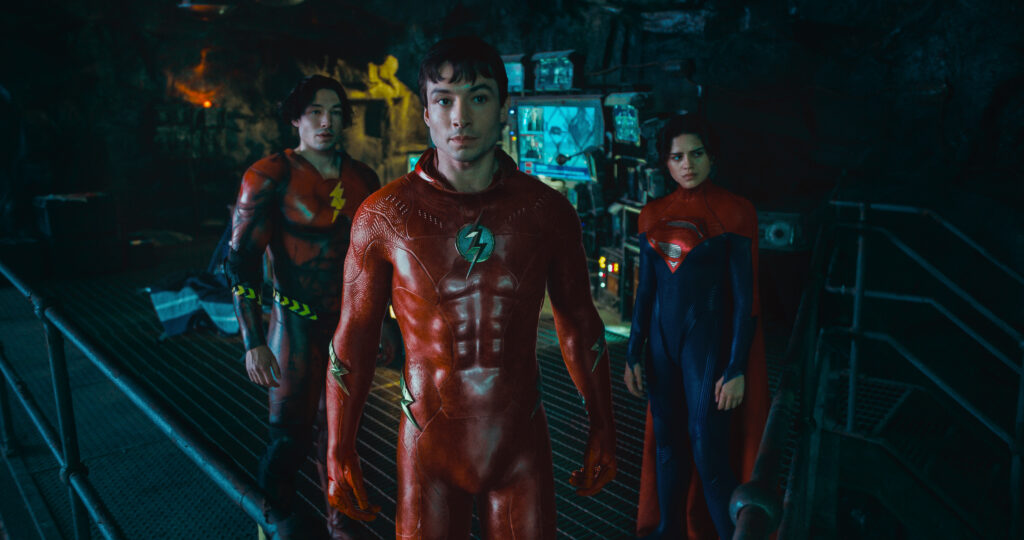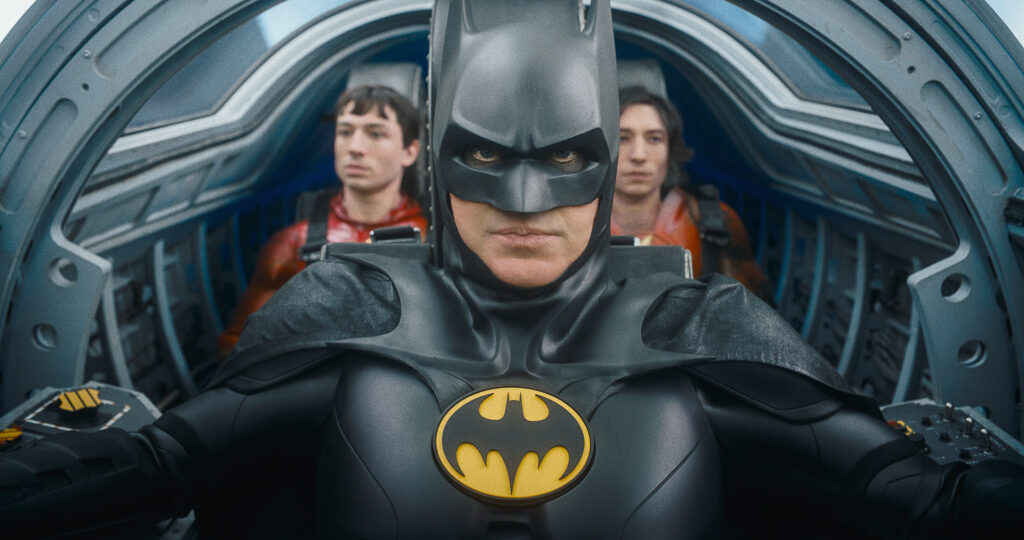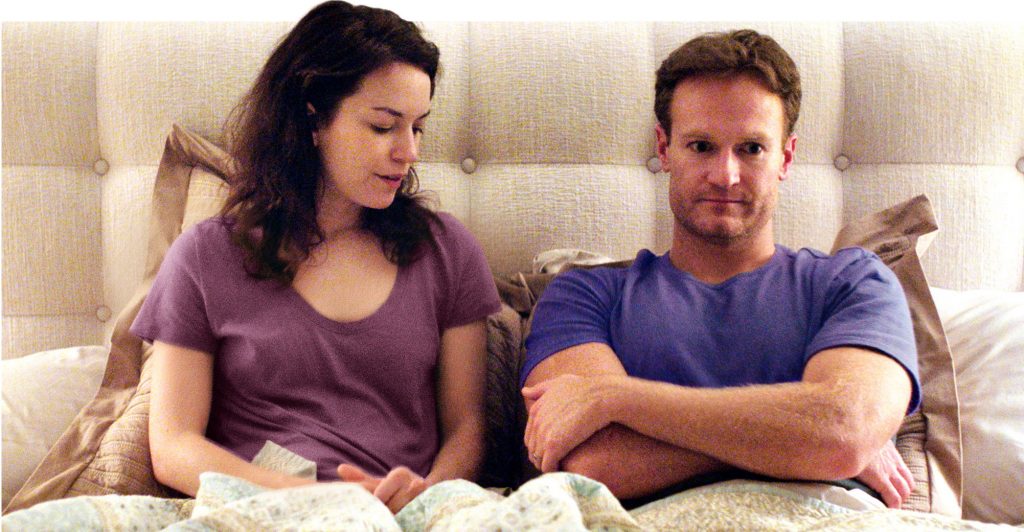June 6, 2023
by Carla Hay

Directed by Andy Muschietti
Some language in Spanish with subtitles
Culture Representation: Taking place in the fictional Central City (in the United States), in Russia, and in a fictional multiverse, the superhero action film “The Flash” (based on DC Comics characters) features a predominantly white cast of characters (with some Latinos and African Americans) representing the working-class, middle-class and wealthy.
Culture Clash: Barry Allen, also known as the superhero The Flash, goes back in time to try to prevent the death of his mother, while the evil General Zod hunts for members of the exiled Krypton family that includes Superman and Supergirl.
Culture Audience: Besides appealing to the obvious target audience of comic book movie fans, “The Flash” will appeal primarily to people who like watching imaginative multiverse movies that don’t get too confusing.

Bold, creative, and with some appealing quirks, “The Flash” lives up to expectations and offers some jaw-dropping surprises. Viewers who are new to the DC Extended Universe (DCEU) won’t get too confused, while ardent fans will be constantly thrilled. Some movies with multiverses can get too convoluted with messy plots, or overstuffed with too many characters. However, “The Flash” (which is based on DC Comics characters) wisely sticks to less than six principal characters that get the most screen time. The movie’s plot (which has some fantastic twists) is easy to follow, although people who’ve seen previous DCEU movies will have a better understanding of everything. Viewers with extensive knowledge of pop culture will also appreciate some of the jokes in the movie.
Directed by Andy Muschietti and written by Christina Hodson, “The Flash” takes place mostly in the fictional Central City, a sprawling U.S. metropolis that is currently under attack by General Zod (played by Michael Shannon), a supervillain whose chief nemesis is Superman, the superhero who has the powers to stop Zod. Superman, who has an alter ego as journalist Clark Kent, has gone missing. Faora-Ul (played by Antje Traue) is a fearless warrior who is General Zod’s second-in-command.
As superhero fans already know, Superman (whose birth name is Kal-El) is a refugee of the planet Krypton, which was destroyed by Zod. Superman’s parents died in this massacre but sent him to Earth as a baby while the attack on Krypton was happening. Did other members of the family survive? All of this background information is useful for what happens later in “The Flash.”
The title character of “The Flash” is man in his 20s named Barry Allen (played by Ezra Miller), whose superhero alter ego is The Flash, who has phenomenal speed. The movie’s opening sequences shows The Flash saving babies from a hospital maternity ward when the building’s hospital was destroyed by Zod and his army. The movie foreshadows what type of comedy it will have by showing that during this crisis, The Flash took the time to eat and drink from a falling vending machine to boost his energy.
In other early sequence, a criminal with a briefcase is apprehended on a bridge by The Flash, Batman (played by Ben Affleck), also known as billionaire Bruce Wayne, and another member of the Justice League (whose identity won’t be revealed in this review) help The Flash. The briefcase contains a weapon that can “wipe out half of Gotham by lunchtime,” warns Bruce’s trusty butler Alfred Pennyworth (played by Jeremy Irons), who has a quick cameo appearance in “The Flash.”
When he’s not being The Flash, shy and insecure Barry is a forensics lab employee at the Central City Research Center, which does a lot of work for the Central City Police Department. Barry is preoccupied with proving the innocence of his father Henry Allen (played by Ron Livingston), who is in prison for the murder of his wife/Barry’s mother Nora Allen (played by Maribel Verdú), who was stabbed to death in their kitchen at home. (Livingston replaces Billy Crudup, who previously played the role of Henry Allen, but Crudup was unavailable to be in “The Flash” because of work commitments on Crudup’s Apple TV+ series “The Morning Show.”) Henry was wrongfully convicted of Nora’s murder and is appealing the conviction. In “The Flash,” Henry is awaiting a court hearing for this appeal.
A flashback shows that Barry at 11 years old (played by Ian Loh) was home and upstairs when the murder happened. Henry had been at a grocery store getting a can of tomatoes at Nora’s request, because she had forgotten to buy the tomatoes earlier. Henry came home to find his wife murdered. However, he doesn’t have a solid alibi. The grocery store’s video surveillance has images of Henry, but he’s wearing a baseball cap, and his face can’t fully be seen in the surveillance video. Henry was the one who discovered Nora’s body, and with no solid alibi, he became the chief suspect in the murder.
Through a series of events, Barry finds himself going back in time and interacting with his 18-year-old self (also played by Miller) in a multiverse that includes the Bruce Wayne/Batman (played by Michael Keaton) of the 1989’s “Batman” and 1992’s “Batman Returns.” When the two Barrys first meet this version of Bruce, he is a bearded and disheveled recluse who denies he was ever Batman, but then he admits it. This Batman grumpily and reluctantly comes out of retirement to help Barry.
The movie makes it easy for viewers to distinguish between the two Barrys: The younger Barry has longer hair, is goofy, and has blue light rays surrounding him when he becomes The Flash. The older Barry has short hair, is more serious, and has red light rays surrounding him when he becomes The Flash. The younger Barry has a homemade Flash superhero suit, while the older Barry’s Flash suit is the “official” Flash superhero suit.
Along the way, these three superheroes encounter Superman’s cousin Kara Zor-El, also known as Supergirl (played by Sasha Calle), who has been imprisoned somewhere in Russia. Because it’s already revealed in the movie’s trailers, Supergirl joins both iterations of The Flash and Keaton’s Batman to team up to fight Zod. Central City journalist Iris West (played by Kiersey Clemons) returns in a supporting role as Barry’s love interest. Iris just happens to be covering Henry’s court case.
Although “The Flash” has a lot of dazzling images throughout the film, the movie’s visual effects fall a little short in scenes where Barry goes to stop time and pick a multiverse to enter. These scenes show flashbacks to other versions of the DC Comics-based movies and TV shows, with the visual presentation looking a little too much like the computer-generated imagery that it is. It’s a little distracting, but it doesn’t ruin the movie.
Miller excels in their performance as the dual Barry Allen/The Flash. (Miller identifies as non-binary in real life and uses the pronouns they/them.) Calle’s performance is a little stiff, but her Supergirl comes out of coma in the movie, so her personality is aloof and more than a little shell-shocked. Keaton steps back into his Batman role perfectly. It’s a performance that will delight fans of the first two “Batman” movies.
“The Flash” has some clever comedy about alternative castings for movies, including a running joke about Eric Stoltz being the star of 1985’s “Back to the Future” in an alternate universe. In real life, Stoltz was fired from “Back to the Future” and replaced by Michael J. Fox. Only people who know this pop culture trivia will really get the jokes. There’s also some surprise and sometimes hilarious references to other actors who were cast or could have been cast as superhero characters in other DC Comics-based entertainment.
“The Flash” is a rollicking adventure that earns its total running time of 144 minutes. The movie has an end-credits scene that is there for pure comedy and has no deep meaning to any sequels. If “The Flash” is the first DC Comics-based movie that a viewer will see, it’s best to know what happened in 2013’s “Man of Steel” and 2021’s “Zack Snyder’s Justice League.” DC Comics-based movies have been hit and miss, in terms of quality, but “The Flash” leaves no question that it’s a “hit” on a storytelling level.
Warner Bros. Pictures will release “The Flash” in U.S. cinemas on June 16, 2023.




